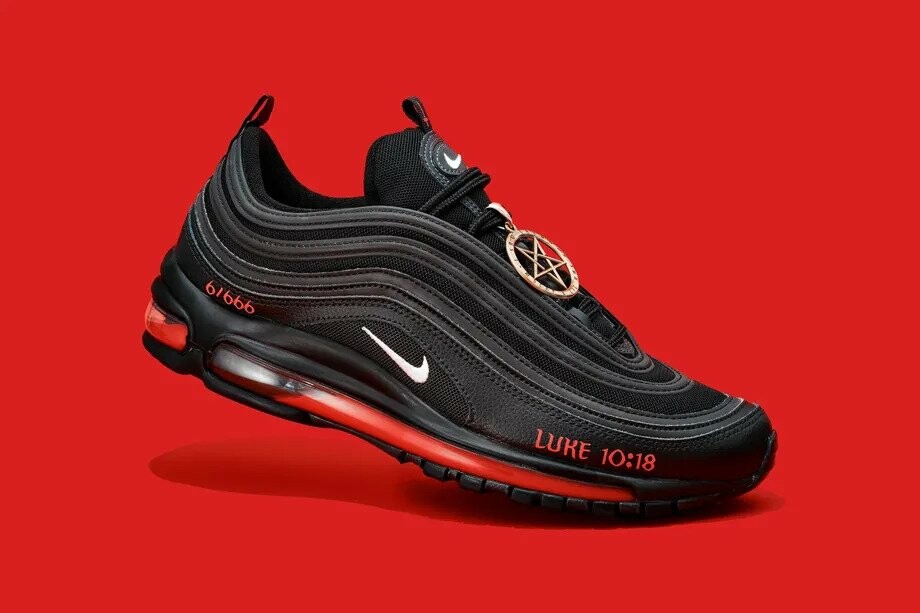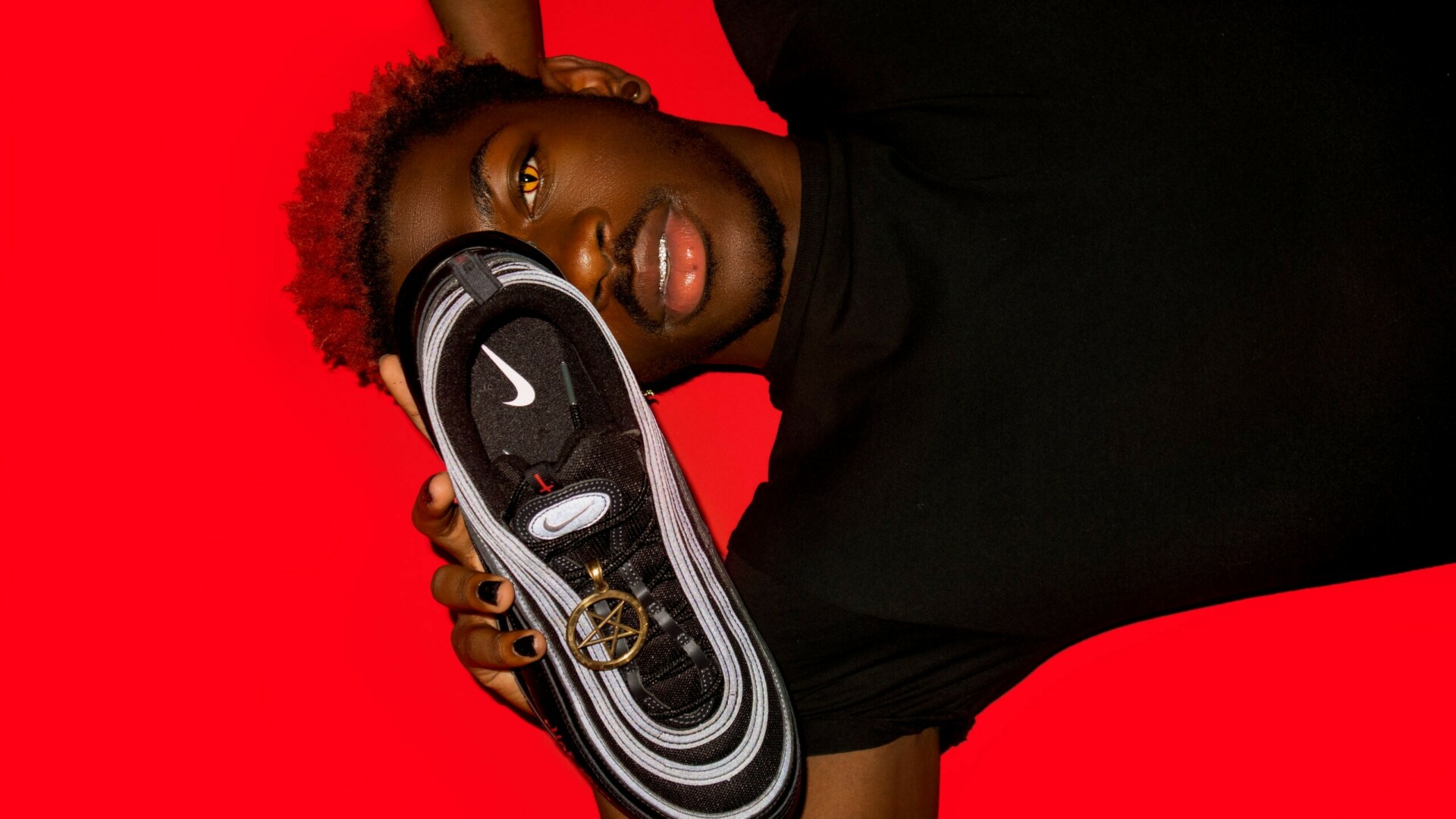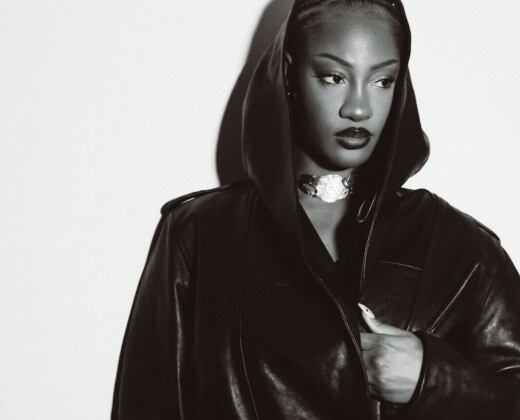Lil Nas X is not here to play, he is here to open a new dialogue. As a young, Black, Homosexual, male, he stands at the crossroads of society’s ‘normality’ and acceptance: in the crux of the intersectional limitations on freedom. Yet the power embedded within him, and the importance of the conversation he has just begun, is invaluable: his art must be seen this way. Lil Nas X is producing and collaborating not just to earn money or fame, he is using his platform to propose a new and potent voice. Now, it’s time to listen.
“You live in the dark, boy, I cannot pretend, I’m not fazed, only here to sin”
MSCHF v Lil Nas X released ‘Satan Shoes’ on 29th March 2021: a drop of 666 (note the satanical reference here) pairs of adapted Nike Air Max 97s, featuring a bronze pentagram charm, an inverted cross, a reference to the Bible Passage Luke 10:18, and 60 cubic centimetres of red ink and 1 drop of human blood in the mid sole. Priced at $1,018, the shoes were released alongside Lil Nas X’s music video for ‘Montreal (Call me by your name)’ and sold out in under a minute. The conversation is unfolding, the controversy is growing, and the conspiracies are being created. But, most importantly? Lil Nas X’s art is being spoken about.
Photo Credit: MSCHF

With their embedded references to the religious construct of ‘Satan’ and ‘Hell’, it’s evident why ‘Satan Shoes’ have sparked a turmoil. The collab has projected fashion into a new territory, a conversation on the correlation between religion and homosexuality, an otherwise untouched topic in contemporary culture and society. This new relationship, however, Lil Nas X’s using of fashion to provoke an analytical look into such intersectionality, has generated a question on collab culture, and the space for boundary-pushing fashion in our contemporary world: have MSCHF v Lil Nas X gone too far, or are they pushing fashion in the direction it must go, viewing fashion as art, creating fashion with impact, using fashion to try and make a change?
Given that America is predominantly Christian (65% of American adults representing Christianity in 2019), the uproar was predictable. Avid tweeters have been quick to criticise Lil Nas X for encouraging the descent into hell, misleading ‘impressionable’ youth onto the wrong track, whilst videos have surfaced showing church sermons teaching the dangers of the ‘Satan Shoe’, explaining its sinfulness and the wrongdoing of Lil Nas X. Yet the irony here is rich: our society has the tendency to overlook atrocities such as homophobia, poverty, inequality, homophobia, police brutality, mass shootings yet is provoked by a shoe design and music video. This speaks volumes and, crucially, tells us exactly why Lil Nas X is doing what needs to be done.

Beyond the fundamental religious controversiality of referencing ‘Hell’ and ‘Satan’, the MSCHF v Lil Nas X collaboration speaks to the truth of being a young, Black, Homosexual man in today’s America. As Lil Nas X himself has since said in a TikTok: ‘yall love telling gay people we going to hell, then get mad when I decide to go!?’. ‘Satan Shoes’ are not simply a two-dimensional, fleeting provocation for fame, they hold a symbolism which expresses the reverberations of his experience of growing up homosexual, the reality of being told you face a life in ‘Hell’ for falling outside of heteronormativity. In a self-addressed letter to his 14-year-old self – ‘dear 14 year old Montero – Lil Nas X explores this: ‘I know we promised never to be “that” type of gay person’ he writes, ‘I know we promised to die with the secret’ … ‘but this will open doors for many other queer people to simply exist’. His hurt is clear, the imposed judgement from society that he has grown with is evident, and thus the power behind his current presence is unignorable. Self-admittedly ‘pushing an agenda’, Lil Nas X is acting with purpose, his ‘Satan Shoes’ are a protest, not a publicity thrill.
This is not to say that Lil Nas X is not benefitting from the subsequent controversy; it has created a storm which was predictable and undeniably planned. However, it is to say that the ongoing conversation regarding the cultural and religious connotations of being homosexual is one of many which needs to happen. Lil Nas X is working with symbolism, not controversy; he is retelling a narrative which has already been told, reclaiming the identity which has already been forced, he is dancing in the metaphorical shadows of punishment. The problem people have with this collaboration, it seems, is not the association but the disassociation: it is not Lil Nas X’s intertwining with ‘Hell’ and ‘Satan’, it is his interaction with a construct which has been used for centuries to oppress and marginalize people; interestingly, this makes us uncomfortable.
Is the shoe the problem, or is it our culture?
On 1st April, 2021, Nike filed a lawsuit (under trademark infringement) to stop MSCHF reproducing or selling any further ‘Satan Shoes’, under the grounds that they did not approve nor authorize the use of their brand and logo in the collaboration. Understandably, they are removing their brand away from the rising controversy, protecting their name and reputation. Yet the repercussions of this lawsuit, the constricts it may pose on future creators and collaborators, poses an important question on the nature of fashion and its interactions with reality. How much is it an independent expression of art, a platform for free creation and empowerment, and how much is it a place of limited consumerism, a static, image driven environment?
As Lil Nas X sings, ‘Call me when you want, Call me when you need, Call me in the morning, I’ll be on the way’, it is clear that the conversation is ongoing, and has only just begun. Although unavailable to buy, the storm created by Lil Nas X and his ‘Satan Shoe’ is more important than we are may at first understand. It is not the blood; it is not the symbols; it is not the references; it is the real, life-changing implications on those who identify within the cross-sections of intersectionality and representation. Hopefully, this conversation won’t stop.
Words By Hannah Emery








